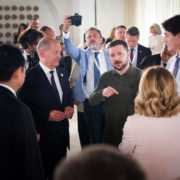Negotiations can’t end the war in Ukraine; it would just evolve

In the coming days, a slew of commentary will claim that the Russia-Ukraine war may well imminently conclude after three years, following peace talks in Saudi Arabia. Such commentary will be wrong.
Regardless of what agreements the United States and Russia may come to, the war would likely continue; it would just evolve.
The belief that a negotiated end to the war would stabilise the status quo is the same misconception as thinking that the war started with Russia’s invasion in 2022 and that it involves only Ukraine and Russia. It also ignores the opportunities for rebuilding that a break in conventional fighting would present to Russian forces.
Russia’s war against Ukraine did not begin with the start of conventional warfare on 24 February 2022. Rather, it followed soon after the ousting of pro-Russian Ukrainian president, Viktor Yanukovych, on 22 February 2014. Russia annexed the Crimean Peninsula on 18 March 2014 and, through proxies, occupied parts of Ukraine’s Luhansk and Donetsk regions. This began a simmering seven-year-long proxy war in Ukraine’s east, long before the outbreak of conventional warfare.
Russia conducted the proxy war predominantly through grey zone tactics: sabotage, subversion and economic warfare. During what is now 11 years of conflict, tactics have also extended to cyberattacks, disinformation and large-scale combat operations.
Conventional warfare is thus an extension of Russian tactics: its beginning did not mark the start of conflict in Ukraine, nor will the end of conventional warfare necessarily mark its end.
Moreover, the conflict is not, nor has it ever been, just a war in Ukraine. Putin long-ago expanded his confrontation with NATO, challenging European interests through intervention in Syria, Libya, Mali, Sudan, Mozambique and the Central African Republic. Much of this was done surreptitiously through the Wagner Group.
Ukraine responded in Sudan and Syria to block Russian interests via a proxy warfare dynamic. In Syria, Ukrainian support of political organisation Hayat Tahrir al-Sham helped to deny Russia the warm water port of Tartus. But in Sudan, Ukrainian support for the government has so far failed to persuade it to refuse a Russian request to set up a naval base there.
Over the past three years, Russia has engaged in more than 150 subversive activities and sabotage operations in European countries. Further horizontal escalations against NATO began before the 2022 escalation in Ukraine. Russia also has a long-demonstrated pattern of ending active conflicts without establishing peace treaties or frameworks. It then exploits these frozen conflicts to coerce opponents.
Considering this history, believing that a nominal end to the Russia-Ukraine war will bring peace is simply naive.
Putin’s very willingness to negotiate now should give pause. By some accounts, Russia has lost 10,000 tanks and nearly a million personnel in the past three years, in addition to an enormous quantity of other materiel. This will take time to re-build.
Russian losses have weakened domestic support for Putin. Russia’s ability to use conventional warfare as a tool of coercion elsewhere is constrained as long as it remains focused on Ukraine. Russia’s military and security budget present amounts to some 40 per cent of the federal budget, while weathering 10 per cent inflation. Under such pressure, there are signs the Russian economy is reaching its breaking point.
Given these conditions, a negotiated end to conventional hostilities would likely embolden, not discourage, Putin.
Having achieved a supposed peace, Putin could be expected to revert to the practiced political warfare handbook and continue to subvert Ukraine’s institutions, while he rebuilt his military power and revelled in the glory of having defied the West. This increasing strength might dash the hopes of pro-democracy groups in Georgia, Belarus and, indeed, in Russia itself.
Putin will also likely increase coercive pressure against the Baltic States, Ukraine, Georgia, and Central Asian countries. Moldova was the victim of a massive Russian influence campaign in 2024 and will almost certainly face another to sway its 2025 parliamentary election.
Understanding such risks, the Nordic and Baltic States have affirmed their ongoing support to Ukraine.
The one thing that a negotiated snap freeze to the Russia-Ukraine conflict would bring would be a false sense of stability and security. In reality, it would mark a shift in Russia’s tactics and a chance for it to rebuild depleted forces.

 FASANO, ITALY - JUNE 13: In this handout image provided by German Government Press Office (BPA), German Chancellor Olaf Scholz (centre, L) and Canadian Prime Minister Justin Trudeau (centre, R) listen to Ukraine President Volodymyr Zelensky (C) on June 13, 2024 in Fasano, Italy. The G7 summit in Puglia, hosted by Italian Prime Minister Giorgia Meloni, the seventh held in Italy, gathers leaders from the seven member states, the EU Council, and the EU Commission. Discussions will focus on topics including Africa, climate change, development, the Middle East, Ukraine, migration, Indo-Pacific economic security, and artificial intelligence. (Photo by Steffen Kugler/Bundesregierung via Getty Images)
FASANO, ITALY - JUNE 13: In this handout image provided by German Government Press Office (BPA), German Chancellor Olaf Scholz (centre, L) and Canadian Prime Minister Justin Trudeau (centre, R) listen to Ukraine President Volodymyr Zelensky (C) on June 13, 2024 in Fasano, Italy. The G7 summit in Puglia, hosted by Italian Prime Minister Giorgia Meloni, the seventh held in Italy, gathers leaders from the seven member states, the EU Council, and the EU Commission. Discussions will focus on topics including Africa, climate change, development, the Middle East, Ukraine, migration, Indo-Pacific economic security, and artificial intelligence. (Photo by Steffen Kugler/Bundesregierung via Getty Images)